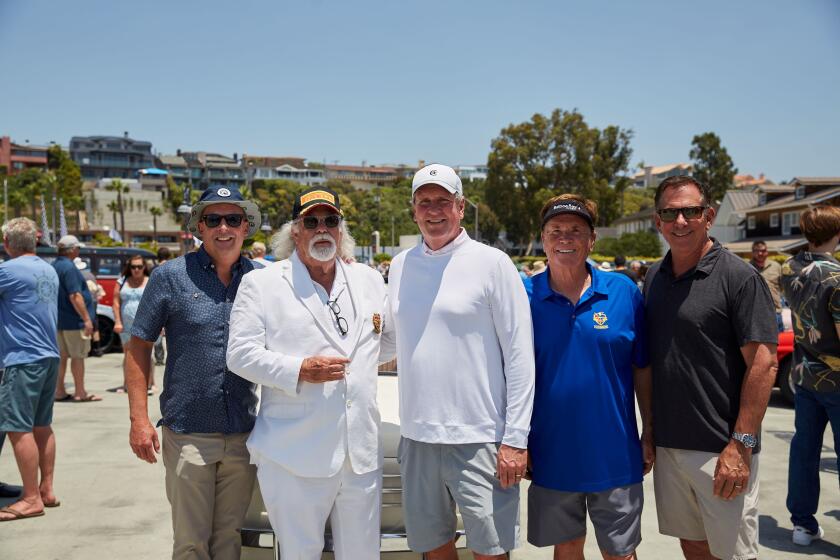Mailbag: Amassed cargo ships are a sign of broken public policy

Across Orange County and Los Angeles waters, cargo ships are overpacked into ports, publicly displaying the backlog in transportation and clogged commerce across the world. Overall demand is significantly higher than the ability of production, leading to backlog and inflation.
For example, a major break in transportation comes from the passage of AB5 and its affect on truck drivers. The law uses what is known as the “ABC” test, which governs who can be labeled an independent contractor and makes it difficult for owner-operators to function in California. There’s also a push to get ships flowing in and out of ports. Policies such as the SHIP ACT introduce legislation prohibiting the idling or anchoring of cargo ships in Southern California, which could increase the circulation of transportation.
Though production will take time to recover from the past few years, policy changes to AB5 and proper attention to shipping will help clear up the supply chain.
Cloe Hughes
Orange
Elected mayor proposal has flaws
Recently, a prominent local attorney, on behalf of several elected and citizens of Newport Beach, wrote and sent a letter to the city attorney citing several flaws in the resolution passed at the Oct. 26, 2021 City Council Meeting having to do with the directly elected mayor initiative proposed by Councilman Will O’Neill. The vote was 4-3 with council members Brenner, Dixon and Mayor Avery dissenting.
Every one of the points in the letter were shot down by the city attorney, including the scheduled special election date for this initiative appearing on the ballot rather than the June 2022 General Election ballot. This special election will cost the city $215,000.
In response to the letter, the city maintains that it has not failed to address the impact and problems associated with the consolidation of seven districts into six. The effect is obvious, and this analysis is a requirement of the California Voters Act. Clearly, the number of constituents that a council member represents has a direct effect on that representatives ability to effectively execute their responsibilities (that is if they even consider keeping in regular contact with their constituents a responsibility of their position). This will have the effect of disenfranchising constituents, neighborhoods and villages within a district. Yet the city maintains the consolidation of districts will have no impact.
The city, by virtue of language in the City Charter, maintains that city council members are not “employees” of the city. I can speak from experience when I tell you that council members do receive a monthly stipend that at the end of each year is reported to the IRS on a W-2 form. The IRS considers this stipend “income”; the city charter states it is a “stipend.” Why do I bring this up? The California Voters Act requires that the employment status effected by this initiative be analyzed. As written, the effect of a directly elected mayor has quite a significant effect on the employment status of the city manager, his or her staff, and additional staffing to support the mayor (and cost in terms of salary and benefits). Yet the city maintains that there will be no effect on staffing because a directly elected mayor and city council members are not considered “employees” of the city.
The biggest objections to the elected mayor proposal are that it creates an abnormally powerful mayor who could serve eight years on council followed by another eight years as mayor for a total of 16 years in office. This is in direct conflict to what the voters approved in the form of term limits in our city. Third, this proposal was conceived by one man, Will O’Neill, without any input from the public. Shouldn’t a change as significant as this be discussed before being voted on? This entire process smacks of the potential for corruption that often results with such radical change.
I encourage you to go to NoElectedMayor.com to read more about this flawed initiative.
Jeff Herdman
Newport Beach
former City Council member
Mobile home owners under threat in H.B.
While I was pleased to read Daily Pilot reporter Matt Szabo’s upbeat article on Huntington Beach looking ahead to 2022, and while I appreciate the leadership of both Mayor Kim Carr this year and next year’s mayor Barbara Delgleize, all is not sunny for a significant segment of homeowners who want to “raise families and invest in the long term.” They are the manufactured-housing homeowners in the mobile home parks controlled by corporate or investment-group interests that have terrorized park residents over the past decade.
While a majority of the city’s 18 mobile home parks, almost evenly split between senior (55-plus) and all-age parks, are “family-owned” investments and run responsibly, a growing number of mobile home parks have been bought by investor groups who have little interest in either the welfare of park residents or the surrounding community. Space rent spiking and other abuses are commonplace in these “corporate” parks. The predator owners are protected by a current City Charter ban on rent control which came about with Measure EE back in 2002.
As abuses mount, many are seeking a “carve-out” to Section 803 of the City Charter that would allow an exemption for mobile home parks. It is estimated that well over 90% of the investment real property covered by the rent control ban would not be affected by a proposed RSO (rent stabilization ordinance) for local mobile home parks.
Mobile home owners are deserving of special treatment because, unlike other investment properties where the owner controls both the land and the improvements (dwellings), there is one owner for the land and another for the dwelling (the mobile home). While the landowner may enjoy certain private-property rights, the homeowner should enjoy certain residential-property rights.
City management is aware of the problem and that something needs to be done to protect this vulnerable segment of homeowners. Both Carr and Delgleize have served as council liaisons to the city’s Mobile Home Advisory Board on which I am the former chair. They are aware that problems and concerns must be addressed. Other members of the City Council, perhaps a majority, share sympathies with these put-upon manufactured-housing homeowners, especially seniors and veterans living on Social Security, fixed incomes and meager investments.
The coming year is likely to be a watershed for the manufactured-housing population in Huntington Beach. Appeals to both local government and state officials are likely to be entertained to stem further assaults on manufactured-housing homeowners and the predatory acquisition of more mobile home parks that would exacerbate the situation.
It is estimated that the lives of approximately 7,000 residents, over 3% of the citizenry, could hang in the balance this coming year. That is what Huntington Beach must look toward in “Riding a New Wave into 2022.”
Tim Geddes
Huntington Beach
Consistency is key beyond editing
Wise writing mirrors wise living. As June Casagrande outlines the importance of consistency in editing, I also suggest that consistency — in spite of Ralph Waldo Emerson’s warning that “consistency is the hobgoblin of little minds,” which was an assertion of individualism and choice as opposed to blind conformity — is a key component of personal integrity as well as good writing.
Ben Miles
Huntington Beach
All the latest on Orange County from Orange County.
Get our free TimesOC newsletter.
You may occasionally receive promotional content from the Daily Pilot.



